

You’re a seafood lover with a zest for adventure? Step aboard Katabatic. On this Marlborough Sounds charter boat guests help to catch lunch/dinner and then watch the skipper, a professional chef, prepare it. Of course, it’s all washed down with some of the region’s finest wines, writes Lawrence Schaffler.
Katabatic’s owner/skipper/chef is Picton local Grant Orchard. The 13m launch is surveyed to carry 16 passengers, but he limits charter parties to a maximum of 10 to keep things easy and intimate.
His playground is the Marlborough Sounds – in Orchard’s opinion, the world’s finest cruising destination, its majesty and grandeur rivalled only by British Columbia. Guests typically join the vessel for half- or full-day trips, boarding the vessel at her Picton Marina berth. He’ll also collect visitors from specific points around the Sounds – usually guests staying at local hotels/lodges.
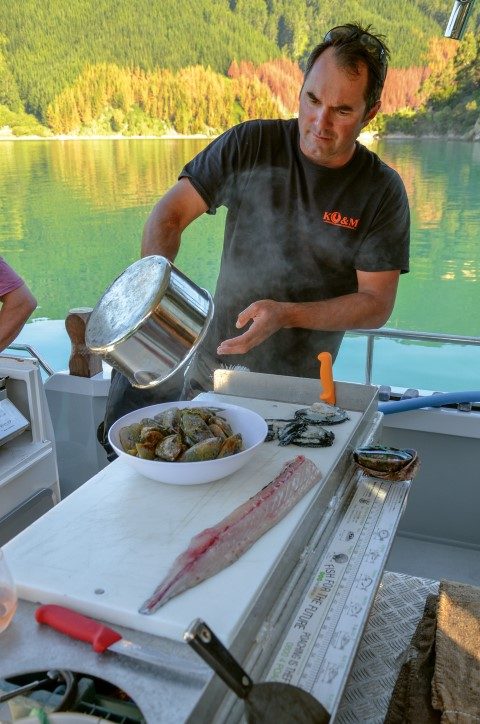
She’s a big, comfortable vessel, superbly equipped for her duties, but it’s the way Orchard presents it that gives this charter operation its point of difference.
“My primary objective,” he says, “is to show guests the magic of the Sounds. It’s an extraordinary area, with a rich, colourful history and spectacular scenery. I want guests to be able to savour its beauty over a leisurely cruise, topping it off with a meal of just-caught seafood. I enjoy involving guests in the entire package – they often become part of the food gathering process.
“We catch the fish, dive for mussels and sometimes paua, collect clams – and while I prepare it in front of them, I tell them about the fauna and flora, the marine species, my recipes and the best way to cook different fish. And I like telling them the story behind Katabatic.”
And that’s a fascinating story.
HUNTER-GATHERING
Here’s a snapshot of a Katabatic charter.
Soon after clearing the Picton marina we deployed a deep swimming lure. Minutes later the reel screamed – as did one of the Aussie guests. The rod was handed to him and, reeling in an energetic kingfish, the expression on his face said it all – pure elation.
He’s a farmer who hails from a particularly parched area of that drought-stricken country. “We don’t have anything like this,” he volunteered after regaining his composure, motioning expansively to the surrounding blue-green vistas. “No bloody water, never mind fish.”
Orchard set Katabatic on a new course and announced we’d be stopping shortly to collect a few green-lipped mussels – nice fat ones. This amounted to hitching the boat’s stern to the end of a nearby mussel farm and hopping overboard with a knife. I was incredulous: “But this is a commercial operation – we can’t just help ourselves…?”
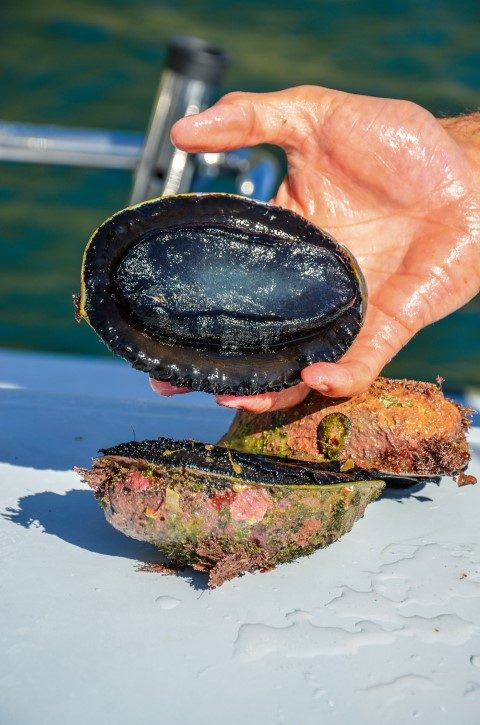
Well, in the Sounds it appears we can. “The mussel farmers down here are a friendly lot,” says Orchard. “They allow us to take a few mussels here and there, but there’s an unspoken rule – no-one abuses the gesture.”
Chugging around a nearby point we stopped to grab a few paua. Orchard told us about their habitat, demonstrated the shucking technique and later the tenderising process. Riveting stuff for someone who’d never eaten paua.
And so it went. A greedy barracouta zapped our lure a little later. Again, the lesson in ecology and biodiversity proved fascinating. I didn’t know that, as a table fish, barracouta are no-go – the reason graphically illustrated in the colony of worms gyrating throughout its insides.
But the unfortunate creature did become the bait when we arrived at an idyllic anchorage a few hours later – and allowed our freshly-blooded Aussie angler, fishing off the back of the boat, to land two fat gurnard.
PREPARING LUNCH
There’s a running commentary – as you might expect from a professional chef. Orchard’s a firm believer in keeping things simple with fish – “no point in drowning the freshness with too many spices.”
In fact, ‘au naturel’ is his favourite fish recipe – thinly-sliced with only a smattering of sesame oil and sometimes chilli sambal to enhance the flavour. “But I will prepare it any way the guests prefer – baked, crumbed, battered – anything’s possible.”
The mussels were steamed – and superb – they don’t come much fresher than this. I’ll declare I’m now a paua convert – cooked a la Orchard – and can also confirm that the freshly-baked focaccia bread is scrumptiously perfect for mopping up the residual juices. Clams are best with white wine and garlic. All accompanied by a fine Marlborough rosé.
ECO-CHARTER
A Katabatic cruise is a relaxed, leisurely affair. She eases along at 8 knots, her 650hp six-cylinder Scania diesel ticking over at a smidgen under 900rpm (the boat’s top speed is 24 knots). This sedate pace reinforces Orchard’s point about ‘savouring’ the Sounds, but it also underscores his commitment to running an eco-friendly operation.
“I elected to fit the Scania because – at the time of building – it boasted one of the lowest carbon-footprints of all diesel engines. Emissions at 900rpm are relatively low, and it also makes for a much quieter, calmer passage.”
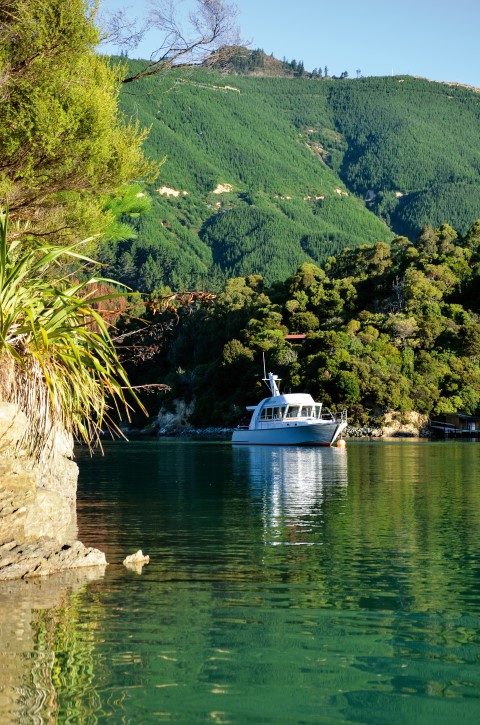
In addition, he pays a voluntary annual tax credit to offset the boat’s carbon emissions – an amount calculated by an independent third party and based on annual diesel and gas consumption. As far as he is aware, says Orchard, he’s the only Marlborough operator doing this. The money’s used to plant forests (native species) around New Zealand and the South Pacific islands.
Katabatic? Anyone who’s boated around the Sounds will be familiar with these boisterous winds that often strike without warning. I’d suggest the boat’s name hints at a similarly invigorating experience for charter guests.
Nothing like a katabatic to whistle the cobwebs from your mind.
FOR MORE INFORMATION
Katabatic Charters at grant@kcandm.co.nz or phone Grant on 021 654 267
https://www.kcandm.co.nz
KATABATIC’S BIRTH
Orchard’s route to chartering Katabatic is a story with many threads but one theme – commitment. How does a professional chef evolve into a charter boat skipper?
Marlborough locals will be aware that he comes from a long line of Orchards – the clan stretches back five generations. In maritime terms, his father (Bill) and grandfather (Fred) were perhaps the most dominant of them. Both were boatbuilders and made their living from the sea. But Orchards from earlier generations were mail boat operators in the Kenepuru and Pelorus Sounds.
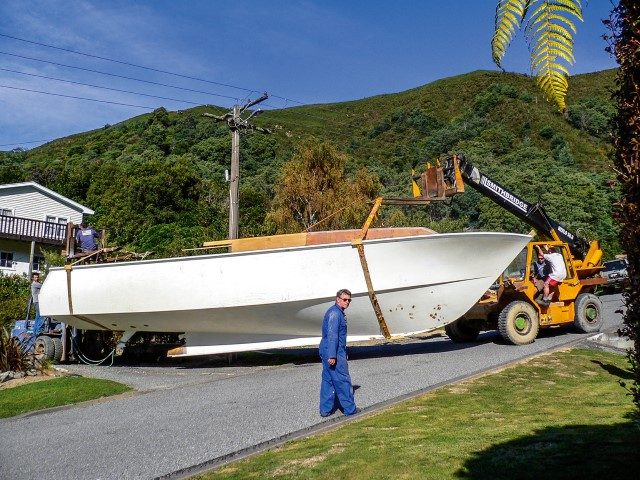
On leaving school, Bill was given a choice by his father – fisherman or boatbuilder? Boatbuilding won, and Bill completed his apprenticeship at Swanson’s Boatyard in the nearby Blackwood Bay. But he did migrate to fishing, owning and operating various vessels around the country, eventually securing a fishing quota in 1986. He also built five launches over the years – all for his own use.
As history often demonstrates, it has a knack of repeating itself. When Grant approached the end of his schooling, Bill presented him with a choice – “you can come commercial fishing – but you’re not staying at home without a job.” So he eventually ended up working on his dad’s tuna-trolling vessel – the Heritage. And at the time, he hated it.
“Dad was a hard man – and working for him wasn’t easy. We had a few rows and after one incandescent bust-up I decided to quit and told him I’d rather wash dishes.
“That decision was a spur-of-the-moment thing, triggered by a healthy measure of rebelliousness, but washing dishes led to me landing a 6,000-hour chef’s apprenticeship with the Puka Park Lodge in Pauanui. And that, in turn, led to a stint of cooking in Melbourne.
“But then Dad was diagnosed with bowel cancer – and I came home. He had, in the meantime, begun building a new boat for himself – just a bare, half-completed hull. Of course, we’d reconciled our differences, and just before he died I told him I was going to finish his boat. I don’t think he believed me. It’s a great pity he never got to see the result.
“A cold-moulded construction – glass over meranti ply – she has white pine frames, ribs and stringers. Dad designed her – but she’s loosely-based on a Pelin – he really liked the Pelins. And I was committed to finishing her – I just didn’t know how I was going to do it. Working as an adult boatbuilding apprentice for $10 an hour wasn’t going to cut it. But, fuelled by the exuberance of youth, nothing was impossible and I pressed on!”
Over the next eight years, Orchard funded the building of the boat by working as chef on luxury superyachts in the Med, Caribbean and the US. It was a nomadic life, back and forth, funding the project piecemeal. He had also inherited a share of his father’s quota license – and sold it to help finish Katabatic.
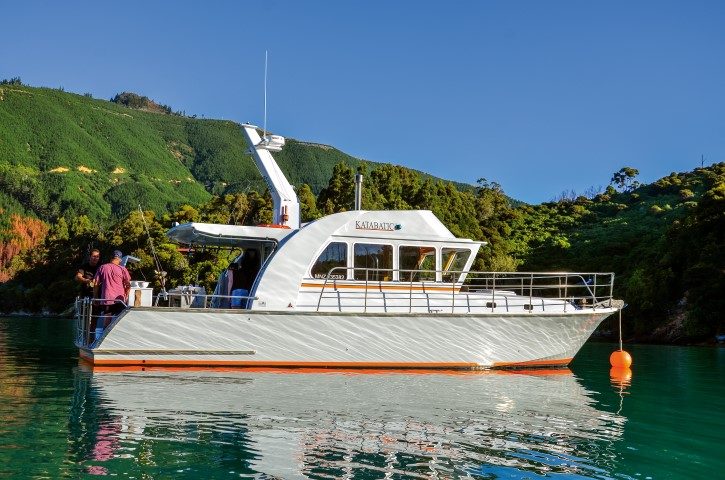
“Much of my drive,” Orchard says, “came from a vision of what I wanted to do with my life – operate a charter boat in the Sounds, utilising my cooking skills. I never abandoned the goal. And fortunately, it’s worked out well – hospitality isn’t a job – it’s a lifestyle. But I love it!”




